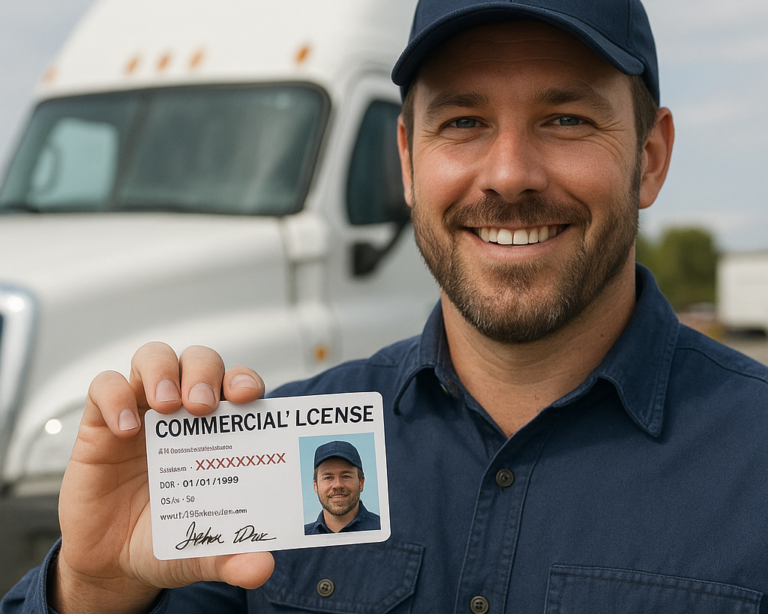The U.S. DOT has decided to implement new measures regarding the requirements for obtaining a CDL and CLP for non-domiciled individuals.
The U.S. Department of Transportation (DOT) has decided to implement new measures regarding the requirements for obtaining Commercial Driver’s Licenses (CDLs) for non-domiciled individuals. After declaring the situation a “national emergency,” the DOT aims to establish a more rigorous system to prevent individuals from obtaining a CDL unless they meet stricter requirements. The goal is to prevent drivers who lack English proficiency from posing a “safety threat,” according to the Department.
Transportation Secretary Sean Duffy stated that these new measures are a direct response to recent fatal accidents involving truck drivers holding non-domiciled licenses. Duffy added that the new requirements will include applying for an employment-based visa and undergoing a federal immigration status verification.
“The process for issuing these licenses is completely flawed. It has become a threat to public safety and constitutes a national emergency that demands immediate action,” Duffy said during a press conference on September 26.

Stricter requirements for CDL and CLP for non-domiciled individuals
Accordingly, the Federal Motor Carrier Safety Administration (FMCSA) announced an interim final rule to be published in the Federal Register on Monday, September 29. The rule limits the authority of state driver’s licensing agencies to issue or renew Commercial Learner’s Permits (CLPs) and CDLs for non-domiciled individuals. According to the FMCSA, this change strengthens the security of the process and improves commercial motor vehicle operations.
Specifically, the rule states that only individuals meeting at least one of the following criteria will be eligible for a non-domiciled CLP or CDL:
- They hold legal immigration status under certain employment-based nonimmigrant visa categories.
- They are domiciled in a U.S. territory.
- They are domiciled in a state that has lost its authority to issue CDLs due to program decertification.
Additionally, as previously mentioned, the requirements for applying for and obtaining a CLP or CDL will be more stringent. To reinforce security and preserve the integrity of the process, the FMCSA’s proposed changes include the following measures:
- Require non-citizen applicants (excluding lawful permanent residents) to present a valid foreign passport and a valid I-94 arrival/departure record showing one of the approved employment-based nonimmigrant visa categories for every issuance, transfer, renewal, or update.
- Require state licensing agencies to check the Alien Status Verification System (SAVE) to verify the accuracy and legitimacy of documents and information submitted.
- Require state licensing agencies to retain copies of application documents for at least two years.
- Require that the expiration date of any non-domiciled CLP or CDL match the expiration date of the individual’s I-94 or be limited to one year—whichever comes first.
- Require in-person presence for every renewal.
- Require the state licensing agency to downgrade a non-domiciled CLP or CDL if it becomes aware that the individual is no longer eligible.

The Owner-Operator Independent Drivers Association (OOIDA) expressed support for these measures, stating that they address long-standing issues that have jeopardized highway safety and undermined professionalism in the trucking industry.
The interim final rule will be published on September 29 in the Federal Register. The public will have 60 days to submit comments through Regulations.gov, using docket number FMCSA-2025-0622.

The best roadside attractions for truckers in the U.S.
America’s highways hide unique places that break up the routine, don’t hesitate to check out these roadside attractions along the way. The road is much

The trucker style: comfort, function, and identity
Truckers’ style is much more than workwear; it’s an identity. These are the most commonly worn garments among truckers. Truckers’ style is much more than

Chaos on Highway 61: Viral Wrong-Way Truck Video Reignites the CDL Debate
An 80-ton tractor-trailer traveling miles in the wrong direction on Missouri’s Highway 61 has reignited a nationwide debate over Commercial Driver’s License (CDL) standards, training

How technology affects driver retention
Friend or foe? 52% of drivers say technology directly influences their decision to stay with or leave a fleet. Fleet telematics company Platform Science published

Dalilah Law seeks to remove non-english speaking commercial drivers
President Donald Trump proposed the “Dalilah Law,” an initiative aimed at prohibiting undocumented immigrants from obtaining commercial driver’s licenses. On February 24, President Donald Trump

FORMULA 1 and the AI That Could Transform Transportation in the U.S.
The artificial intelligence system that Formula 1 implemented to monitor every car on every turn is opening the door to new applications in trucking, logistics,
All content and original artwork, unless otherwise noted, is protected by copyright. Saint George uses certain images under license from various licensing vendors for this purpose. Any unauthorized commercial reproduction or distribution of copyrighted materials is prohibited.
